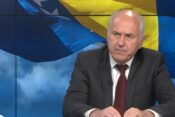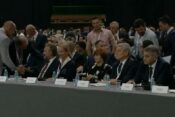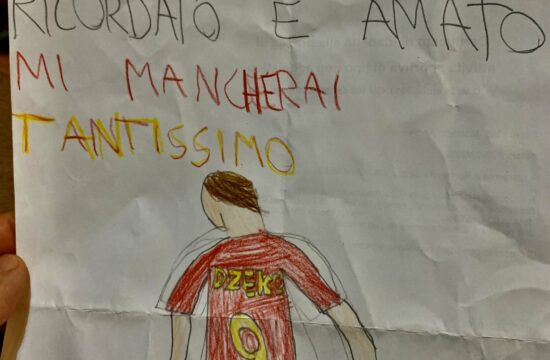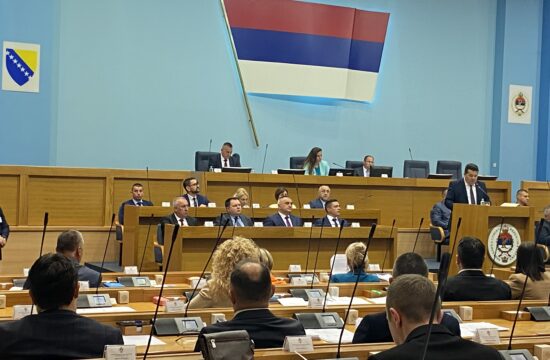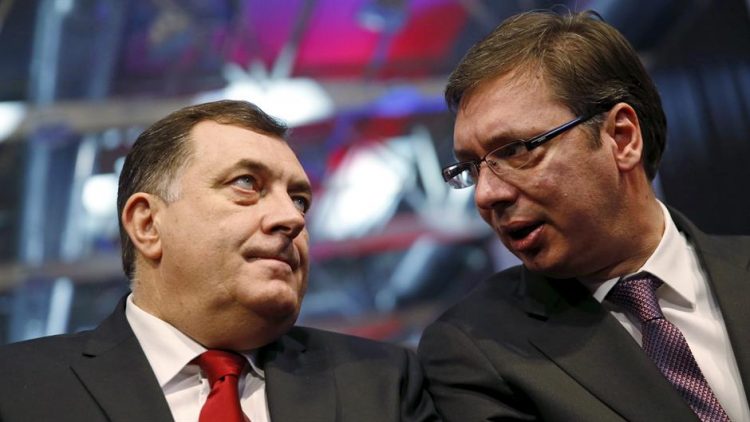
Bosnian Serb leader Milorad Dodik has on Wednesday announced that a meeting between the leaders of all parties in Bosnia’s Serb-dominated Republika Srpska (RS) entity and Serbian President Aleksandar Vucic will take place on Saturday in Belgrade, and that they will discuss whether to demand the abolishment of the Office of the High Representative - the international official overseeing the civilian implementation of the 1995 Dayton Peace Agreement.
“We believe that Serbia, as a signatory to the Dayton Agreement, should request a report from the High Representative about his work and evaluate whether it was in accordance with the Dayton Agreement and the Constitution of Bosnia and Herzegovina and react to what we have concluded here today, namely that we will ask the signatories of Annexe 10 of the Dayton Agreement to distance themselves from the High Representative and request the abolishment of the body,” Dodik said.
The Bosnian Serb leader, who has for years been advocating for the secession of the RS from the country, has been at odds with previous High Representatives in the country, as well as with the current one, Austrian diplomat Valentin Inzko. He has accused them of breaching international law and the Dayton Agreement and working against the RS.
The upcoming meeting comes after the main Bosniak party in the country, the Party of Democratic Action (SDA), adopted a declaration of long-term goals on Saturday. It said it wants to work toward, among other things, the establishment of a ‘Republic of Bosnia and Herzegovina’ and the affirmation of a ‘Bosnian language’ as the ‘common identity of all of Bosnia’s citizens’.
Bosnia is according its Constitution, which is part of the 1995 Dayton Peace Agreement, composed of two semi-autonomous regions – the Serb-majority Republika Srpska (RS) and the Federation of Bosnia and Herzegovina (FBiH), mostly shared between Bosniaks and Croats. The entities are linked into a state by common institutions.
The state-level government is set up according to a power-sharing system between three majority ethnic groups, or ‘constituent peoples’ – Bosniaks, Croats and Serbs.
The SDA Declaration has caused an uproar among Bosnian Serb and Bosnian Croat representatives.
Bosnian Serb leader Milorad Dodik said that it represents an attack on the 1995 Dayton Peace Agreement which ended the war and on Bosnia’s constitutional setup, as the party wants to dissolve the RS.
Bosniaks want a state set up “on their own terms” he said, adding that Serbs “will not endure political torture.”
According to Serbia’s President, Aleksandar Vucic, changing the constitutional setup in Bosnia would produce “big problems.”
Bosnia’s Security Minister Dragan Mektic, from the Serb Democratic Party (SDS), said he does not know whether he would attend the meeting if he was party leader. He argued that Serbia's Vucic worked against the SDS during the last election.
Mektic’s party colleague and a lawmaker in the RS National Assembly, Nebojsa Vukanovic, said that the entire discussion over the SDA Declaration is a “political game” between the political leaders.
“They are setting the playing field for each other and raising tensions in order to divide our peoples even further, so it is easier for them to rule,” Vukanovic said. “Maybe, in the beginning, they could manipulate most people with these games, but I think that most are bored of them now and no ody will fall for these tricks.”
He argued that what political leaders should rather be talking about is “the exodus and the migrations which have last been seen during the middle ages, the anarchy and lawlessness that is in place, and not about some dumb declarations and resolutions.”
Vukanovic compared the SDA Declaration to the one Dodik’s Alliance of Independent Social Democrats (SNSD) adopted in 2015.
“Back then, Dodik promised an independent Republika Srpska by 2018,” Vukanovic stressed, adding that “now when you ask them (the SNSD) about it, they are silent.”


